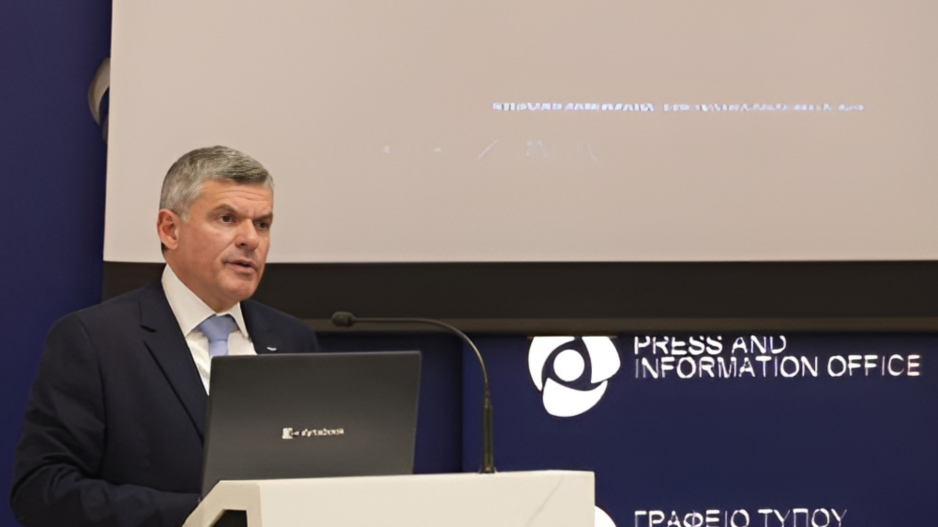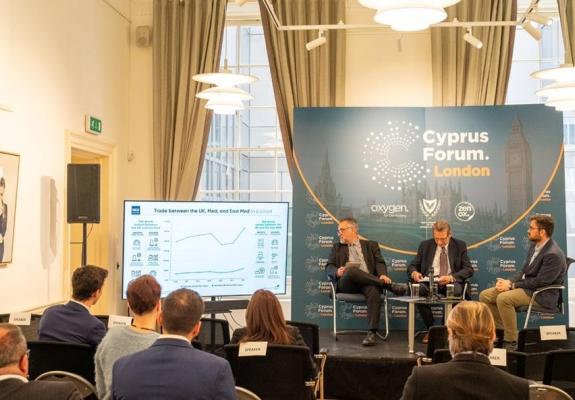Energy Minister Opposes Surcharge Before Operation of Greece-Cyprus Electricity Interconnector
George Papanastasiou Outlines Progress in Electricity Projects and Developments in the Cypriot Exclusive Economic Zone
Cypriot electricity consumers should not be burdened with a surcharge before the operation of the electricity interconnector linking Greece and Cyprus, which would result in lower electricity costs, said Minister of Energy, Commerce, and Industry George Papanastasiou.
Speaking at a press conference to review the Ministry’s work over the past year, Papanastasiou explained that the request by the project’s promoter, Greece’s Independent Power Transmission Operator (IPTO), to add a surcharge to electricity bills to recover its investment in the €1.9-billion project, is being reviewed by the electricity regulators in Cyprus and Greece. These regulators will consider consumer protection in their decision.
"This is a matter of principle. If the cable isn't operational, no one has the right to charge anyone for future use," Papanastasiou emphasized.
Acknowledging the multiple benefits the interconnector will bring to Cyprus, with expected commercial operation in 2029, he noted that the project's cost is high, and the introduction of renewable energy into the electricity mix depends on the interconnection. The cost allocation is 63% for Cyprus and 37% for Greece, as the cable interconnection will offer greater advantages to Cypriot consumers.
Regarding developments in the Cypriot Exclusive Economic Zone (EEZ), Papanastasiou said that the ExxonMobil and Qatar Energy consortium is conducting 3-D seismic surveys in block 5, which "offer some optimism." The consortium is expected to carry out an appraisal well in the Glaucus gas field in block 10 in 2024, with an estimated 5 to 8 trillion cubic feet of natural gas.
Based on the Glaucus 2 appraisal well, additional exploratory targets have been identified in blocks 5 and 10, while potential synergies with neighboring discoveries are being explored. The Ministry encourages energy companies operating in the Cypriot EEZ to pursue these synergies so that gas fields could be connected via pipelines, allowing for the joint development of infrastructures.
In the "Cronos" and "Zeus" gas fields, operated by Italy's ENI and France's TotalEnergies, Papanastasiou said the gas quality is excellent. The Ministry is awaiting the submission of the Development Plan for "Cronos," which will be evaluated with the aim of reaching an agreement this year.

Construction works for the LNG terminal in Vasilikos have resumed, with infrastructure completion expected by late 2024 or early 2025. The floating regasification unit is set to arrive in May or June 2024.
Meanwhile, the Cyprus Natural Gas Public Company (DEFA) will proceed with the implementation of the inland gas distribution network, and actions are being taken to secure LNG provision contracts. Papanastasiou mentioned that natural gas for electricity generation should be introduced by mid-2025.
Regarding renewable energy, Papanastasiou highlighted the operation of the first phase of a digital platform for licensing applications and a completed study aimed at streamlining the process. Cyprus’s Integrated National Energy and Climate Plan is expected to be submitted in June 2024.
In terms of future plans, the Energy Minister noted the ongoing efforts to upgrade, digitalize, and expand the electricity grid using a €120 million EU grant, along with implementing the ten-year program for developing the Transmission System.
Papanastasiou also mentioned the "Photovoltaics for All" program, which has received 5,100 applications so far, with a target of 6,000 applications. He also highlighted the substantial increase in grants from the Renewable and Energy Conservation Fund, which reached €23.5 million in 2023, compared to €5.8 million in 2022, with applications rising by 64% year-over-year.






